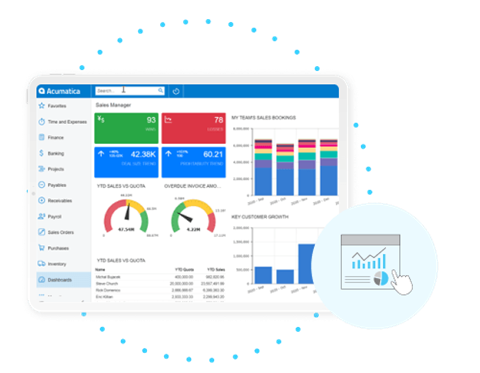 In today’s rapidly evolving business landscape, small to mid-sized businesses (SMBs) are constantly seeking innovative solutions to stay afloat amidst fierce competition. One way they are doing that is by switching to a cloud-based ERP solution. This switch can be a significant shift for SMBs, providing a comprehensive suite of business applications hosted on a cloud service provider’s platform, allowing users to securely work from anywhere, on any device. It can also change the way businesses operate, lowering costs, and providing ease-of-use not seen in traditional on-premises ERP solutions.
In today’s rapidly evolving business landscape, small to mid-sized businesses (SMBs) are constantly seeking innovative solutions to stay afloat amidst fierce competition. One way they are doing that is by switching to a cloud-based ERP solution. This switch can be a significant shift for SMBs, providing a comprehensive suite of business applications hosted on a cloud service provider’s platform, allowing users to securely work from anywhere, on any device. It can also change the way businesses operate, lowering costs, and providing ease-of-use not seen in traditional on-premises ERP solutions.
Let’s look closer at the benefits of Cloud ERP, reasons to move from on-premises to the cloud, and how it’s helping SMBs thrive in today’s digital economy.
Navigating the ERP Landscape
Traditionally, ERP systems were installed on-premises, requiring businesses to manage the hardware and software infrastructure.
However, cloud tech has revolutionized the ERP landscape, giving rise to Cloud ERP. This type of ERP solution operates on cloud servers accessed over the internet, offering a plethora of benefits over traditional on-premises systems.
Breaking Down the Benefits of Cloud ERP for SMBs
Cloud ERP brings a host of advantages for SMBs, allowing you to speed up processes, improve collaboration, enhance data visibility, and more. Let’s dive deeper into these benefits:
1. Streamlined Operations and Improved Collaboration
Cloud ERP integrates various business functions into a centralized platform, facilitating real-time data sharing and collaboration among departments. This streamlined flow of information eliminates data silos and redundancies, leading to improved productivity and efficiency.
2. Real-time Data Access and Enhanced Visibility
With Cloud ERP, businesses can access real-time data from anywhere, anytime. This on-demand data access provides a 360-degree view of the business, enabling decision-makers to make informed decisions quickly.
3. Scalability and Flexibility
Cloud ERP solutions offer unparalleled scalability and flexibility. They can easily scale up or down to accommodate business growth or contraction. Moreover, they allow businesses to integrate third-party applications seamlessly, enhancing the system’s functionality and adaptability.
4. Lower Operating Costs
Unlike on-premises ERP systems that require hefty upfront investments in hardware and software, Cloud ERP operates on a subscription-based model, reducing the capital expense and providing a predictable investment. Additionally, since the vendor maintains the infrastructure, businesses can save on maintenance and support costs.
5. Making the Big Move: From On-Premises to Cloud ERP
While the benefits of Cloud ERP are undeniable, the decision to transition from an on-premises system to a cloud-based solution is not one to be taken lightly. Here are some compelling reasons to consider making the big move:
- Lower Costs
With Cloud ERP, businesses can significantly reduce upfront implementation costs. Furthermore, the ongoing costs can also be lower when you factor in maintenance and support, which typically account for 20% of the initial license costs in on-premises systems.
- Easier Upgrades and Maintenance
With Cloud ERP, businesses no longer have to fret about software upgrades or maintenance. The vendor handles these aspects, ensuring that the software is always up-to-date and compliant with all relevant regulations.
- Access to Cutting-edge Technology
Cloud ERP enables businesses to leverage emerging technologies such as artificial intelligence, machine learning, and advanced analytics. These technologies can harness vast amounts of data to generate insightful forecasts, uncover hidden trends, and enhance operations.
- Enhanced Security
Contrary to common apprehensions, Cloud ERP solutions offer robust security measures, including encryption, multi-factor authentication, and secure data centers. Thus, businesses can rest assured that their data is safe and secure in the cloud.
- Faster Implementation
Cloud ERP solutions can be configured and deployed significantly faster than on-premises systems. This quick deployment reduces downtime and allows businesses to swiftly adapt to changing market conditions.
- Increased Accessibility
With Cloud ERP, businesses can access their system from any device with an internet connection. This increased accessibility enables remote working and ensures that key decision-makers stay connected even when they are on the move.

Cloud ERP Success Stories
Several SMBs have reaped the benefits of transitioning from on-premises ERP to Cloud ERP. For instance, Lifeway Mobility, a CAL customer, lowered IT expenditures, all while getting mobile access and increasing customer service by switching to a cloud-based ERP solution, Acumatica. Read their story here.
The Bottom Line: Embracing the Cloud ERP Revolution
The rapid advancements in cloud technology have ushered in a new era of ERP solutions that promise unprecedented benefits for SMBs. From streamlining operations and improving collaboration to enhancing visibility and reducing costs, Cloud ERP is a game-changer in today’s fast-paced business environment.
While the transition from an on-premises system to a cloud-based solution may seem daunting, the long-term benefits far outweigh the short-term challenges. By harnessing the power of Cloud ERP, SMBs can future-proof their businesses and stay ahead of the curve in today’s intensely competitive business landscape.
If you are considering an ERP move, join us at one of our upcoming webinars to learn more!
By CAL Business Solutions, Acumatica and Microsoft Dynamics GP/365 BC Partner, www.calszone.com









